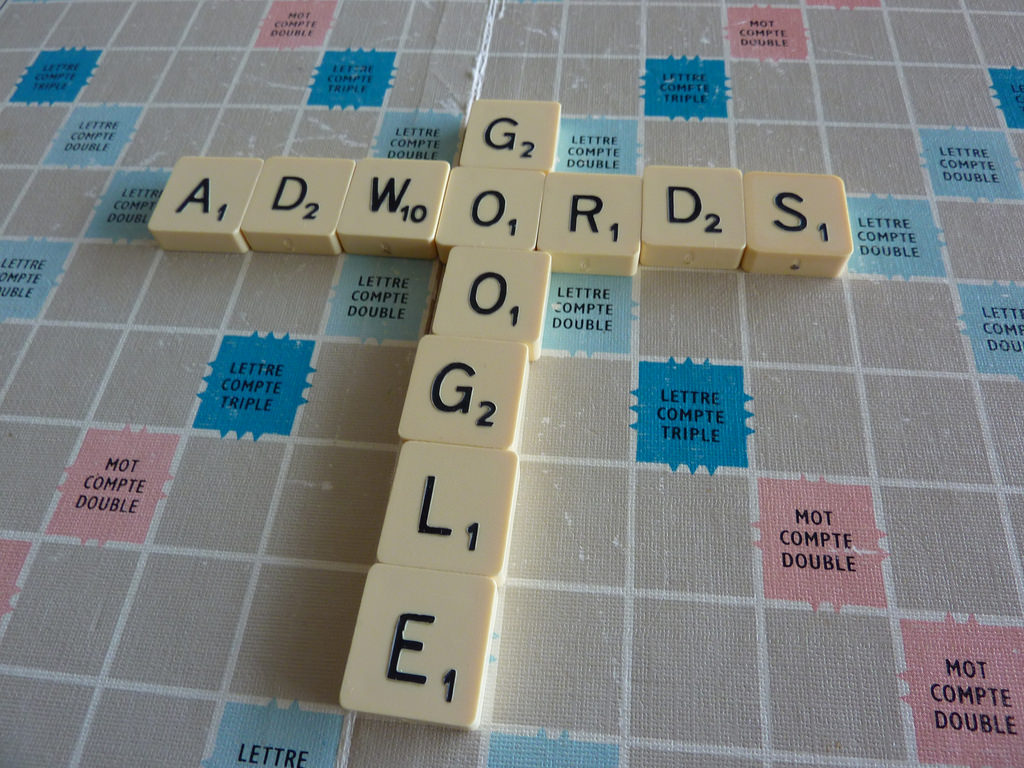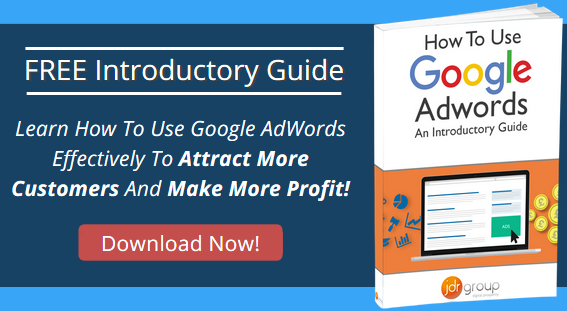A Guide to Keyword Match Types in Google AdWords
by Will Williamson on 13-Feb-2015 07:52:00

When creating a pay-per-click (PPC) campaign for Google AdWords, a decision will need to be made relative to the keyword match type you’d like to use. Why? Google needs to know how specifically you want your ads to match user searches. Before you decide which AdWords match types to use, you should first gain an understanding of the categories available, as well as how each works. Here is a list and description of each of the six match types in AdWords.
Broad Match
Listed by Google as the “default matching option”, the broad match category is best if you want your ads to show in results where your preselected keywords were entered in any order. The ads could also appear if close variations on the keyword are entered. This is also a good option for those who don’t have the time to invest in creating in-depth keyword lists.
Broad Match Modifier
As suggested by the name, a broad match modifier is a spinoff of the broad match option. The difference is that when a modifier is added, the words must appear in the search criteria, and variations on said word will not show. For example, if you selected the keyword phrase “boys shoes”, your ad may appear if someone searched using the phrase “shoes for boys”, but your ad would not appear if someone searched using the phrase “boys boots”. Modifiers can be identified by adding the “+” symbol in front of the relevant word (+boys +shoes).
Phrase Match
Using the phrase match option, ads will appear in search results when a person searches using the exact keyword phrase you entered. Your ad may also show if a person uses the keyword but adds words before or after it, or with close variations. For instance, if you’ve chosen the keyword phrase “blue car”, your ad will appear when someone searches using the phrase “light blue car” or “blue cars”, but it will not appear if the user searches using the phrase “blue used car”. Phrase match keywords are identified by their surrounding quotations.
Exact Match
Just as the name suggests, exact match will only work when someone enters the exact words you’ve chosen. This option allows for more specific targeting than the other options. However, if additional words are added to the users search criteria, or a synonym is used (ex: pants instead of slacks), your ad will not appear in the results. Identify exact match keywords by surrounding them with brackets.
Negative Match
Use this option to prevent unwanted ad traffic and clicks. By adding a negative symbol (“-“) at the beginning of the keyword you can keep your ad from appearing in search results that use that phrase. You can also use negative match with other match types. For example, if you don’t want your ad to appear in any search that uses the exact phrase “dog treats”, simply create it as follows: -“dog treats”.
Which Keyword Match Type Should You Use?
Google recommends taking a ‘broad to narrow’ approach when selecting the match type. That way, there is more of a chance that your ad will appear in relevant search results. However, you’ll need to monitor your choices to ensure that you aren’t getting too many irrelevant hits. Remember that you pay for every click, so choosing relevant keyword match types is critical to your ROI.
After you’ve received enough impressions and clicks to analyse, pour over the search terms report to identify the keywords and variations that brought up your ads. If the variations in the report aren’t relevant try using phrase match or exact match. The report will also tell you which keywords to eliminate through the use of negative match.
Selecting the right keyword match types is not an exact science, and your choices should be monitored and regularly tested. However, the effort will pay off in saved clicks (which saves money) and an increase in quality leads, because it communicates clearly to Google under what search criteria you want your ad to be displayed.
Article by Will Williamson
- Inbound Marketing (SEO, PPC, Social Media, Video) (832)
- Strategy (368)
- Sales & CRM (197)
- Marketing Automation & Email Marketing (192)
- Business Growth (168)
- Website Design (162)
- Hubspot (141)
- Lead Generation (117)
- Google Adwords (100)
- Content Marketing (94)
- Conversion (53)
- Case Studies (49)
- News (47)
- Ecommerce (39)
- Webinars (36)
- SEO (27)
- AI (21)
- Events (19)
- LinkedIn Advertising (17)
- Video (17)
- Video Selling (15)
- Software training (13)
- Niche business marketing (11)
- The Digital Prosperity Podcast (10)
- Facebook Advertising (8)
- HubSpot Case Studies (7)
- Web Design Case Studies (1)
- February 2026 (9)
- January 2026 (12)
- December 2025 (15)
- November 2025 (6)
- October 2025 (17)
- September 2025 (16)
- August 2025 (14)
- July 2025 (14)
- June 2025 (5)
- May 2025 (19)
- April 2025 (15)
- March 2025 (13)
- February 2025 (13)
- January 2025 (8)
- December 2024 (2)
- November 2024 (4)
- October 2024 (21)
- September 2024 (4)
- August 2024 (8)
- July 2024 (14)
- June 2024 (16)
- May 2024 (25)
- April 2024 (15)
- March 2024 (18)
- February 2024 (5)
- January 2024 (10)
- December 2023 (6)
- November 2023 (10)
- October 2023 (13)
- September 2023 (12)
- August 2023 (14)
- July 2023 (13)
- June 2023 (14)
- May 2023 (15)
- April 2023 (13)
- March 2023 (14)
- February 2023 (13)
- January 2023 (15)
- December 2022 (13)
- November 2022 (6)
- October 2022 (8)
- September 2022 (22)
- August 2022 (15)
- July 2022 (13)
- June 2022 (16)
- May 2022 (14)
- April 2022 (16)
- March 2022 (17)
- February 2022 (11)
- January 2022 (8)
- December 2021 (6)
- November 2021 (7)
- October 2021 (11)
- September 2021 (10)
- August 2021 (7)
- July 2021 (7)
- June 2021 (4)
- May 2021 (4)
- April 2021 (1)
- March 2021 (3)
- February 2021 (5)
- January 2021 (4)
- December 2020 (7)
- November 2020 (6)
- October 2020 (5)
- September 2020 (9)
- August 2020 (18)
- July 2020 (17)
- June 2020 (17)
- May 2020 (10)
- April 2020 (21)
- March 2020 (24)
- February 2020 (21)
- January 2020 (12)
- December 2019 (23)
- November 2019 (12)
- October 2019 (14)
- September 2019 (16)
- August 2019 (15)
- July 2019 (13)
- June 2019 (6)
- May 2019 (8)
- April 2019 (4)
- March 2019 (2)
- February 2019 (2)
- January 2019 (2)
- December 2018 (3)
- November 2018 (24)
- September 2018 (11)
- August 2018 (9)
- June 2018 (3)
- May 2018 (6)
- April 2018 (14)
- March 2018 (12)
- February 2018 (16)
- January 2018 (15)
- December 2017 (15)
- November 2017 (18)
- October 2017 (23)
- September 2017 (19)
- August 2017 (28)
- July 2017 (27)
- June 2017 (25)
- May 2017 (18)
- April 2017 (17)
- March 2017 (16)
- February 2017 (17)
- January 2017 (14)
- December 2016 (21)
- November 2016 (27)
- October 2016 (25)
- September 2016 (16)
- August 2016 (20)
- July 2016 (19)
- June 2016 (14)
- May 2016 (20)
- April 2016 (24)
- March 2016 (22)
- February 2016 (28)
- January 2016 (27)
- December 2015 (28)
- November 2015 (19)
- October 2015 (9)
- September 2015 (12)
- August 2015 (5)
- July 2015 (1)
- June 2015 (10)
- May 2015 (3)
- April 2015 (11)
- March 2015 (14)
- February 2015 (15)
- January 2015 (12)
- December 2014 (2)
- November 2014 (23)
- October 2014 (2)
- September 2014 (2)
- August 2014 (2)
- July 2014 (2)
- June 2014 (7)
- May 2014 (14)
- April 2014 (14)
- March 2014 (7)
- February 2014 (2)
- January 2014 (7)
- December 2013 (9)
- November 2013 (14)
- October 2013 (17)
- September 2013 (3)
- August 2013 (6)
- July 2013 (8)
- June 2013 (4)
- May 2013 (3)
- April 2013 (6)
- March 2013 (6)
- February 2013 (7)
- January 2013 (5)
- December 2012 (3)
- November 2012 (2)
- September 2012 (1)
Subscribe by email
You May Also Like
These Related Blogs

A Quick & Easy Guide To Google AdWords Keyword Match Types
Google AdWords is a vast advertising platform and as a business owner, it can sometimes be tricky trying to find the time to learn more about the plat …

Google AdWords Keyword Match Types – How To Save Money & Get Better Results
Google AdWords keyword match types tell Google how you want it to match your ads to keyword searches – whether you want to be restrictive or show your …

Why Use Negative Keywords In Google AdWords?
Google AdWords is a powerful tool for advertising your brand online. But with the success of Google as the go-to search engine, the prices that popula …



